5 Smart Amazon Keyword Research Tips for FBA Sellers
FBA sellers have a big advantage over many other marketplaces – Amazon has one of the most advanced fulfilment networks in the world. So how does FBA work? To boil it down, you store your products in Amazon’s fulfilment centres, and the company will pick, pack and ship the products for you. They even provide customer service on your behalf!
If you’re a Fulfillment by Amazon (FBA) seller, then you need to be ahead in the marketing gameplan in to advertise and sell your products. It can be an extremely lucrative business, but it’s also a highly competitive space.
You must be well aware of the fact that although there are more people visiting and shopping on Amazon today, there’s also an increasing number of FBA sellers in the market. This is expected, given that Amazon records over $4,722 in sales per minute!
The question is, how can you make your products more visible on Amazon search results? How can you make your product stand out from the crowd?
It takes an effective use of relevant focus keywords and long tail keywords, intelligent keyword research, and stellar Amazon search engine optimization (SEO) efforts in order to market your product as an FBA seller amid the variety of Fulfillment competitors out there.
If you’re looking to rank your products better, here are some Amazon keyword research tips.
Amazon Keyword Research Tips
1. Compare and contrast your keywords
Optimization entails the use of effective, relevant keywords so that your products become prominent and gain recognition high up on Amazon’s Search Engine Results Pages (SERP). However, it takes skill to come up with effective keywords that will help your product compete and stand out in the market without wasting your entire marketing budget.
One way to do this is to compare and contrast your keywords for your products being sold. Chances are that your products are confined to one industry where similar products are competing for the same market. To capture as large a portion as possible, imitation is key.
Try to check for keywords used by other competitors. If imitation is the key, revision is the answer. You can make little tweaks here and there with the keywords to see what works best for you. Then, all you have to do is target those keywords to ensure that your product becomes prominent on the SERPs.
2. Find similar, alternative keywords
One mistake that sellers commonly make when collecting keywords is narrowing their field too much. Let’s say that you are selling an MP3 player. Keywords should not be merely confined to that specific product. It’s best that you widen your search to other similar devices such as iPod and the likes. The products may not necessarily be the same, but the related keywords may apply.
To find related keywords that you can also insert in your product title and description, use Keyword Tool for Amazon:
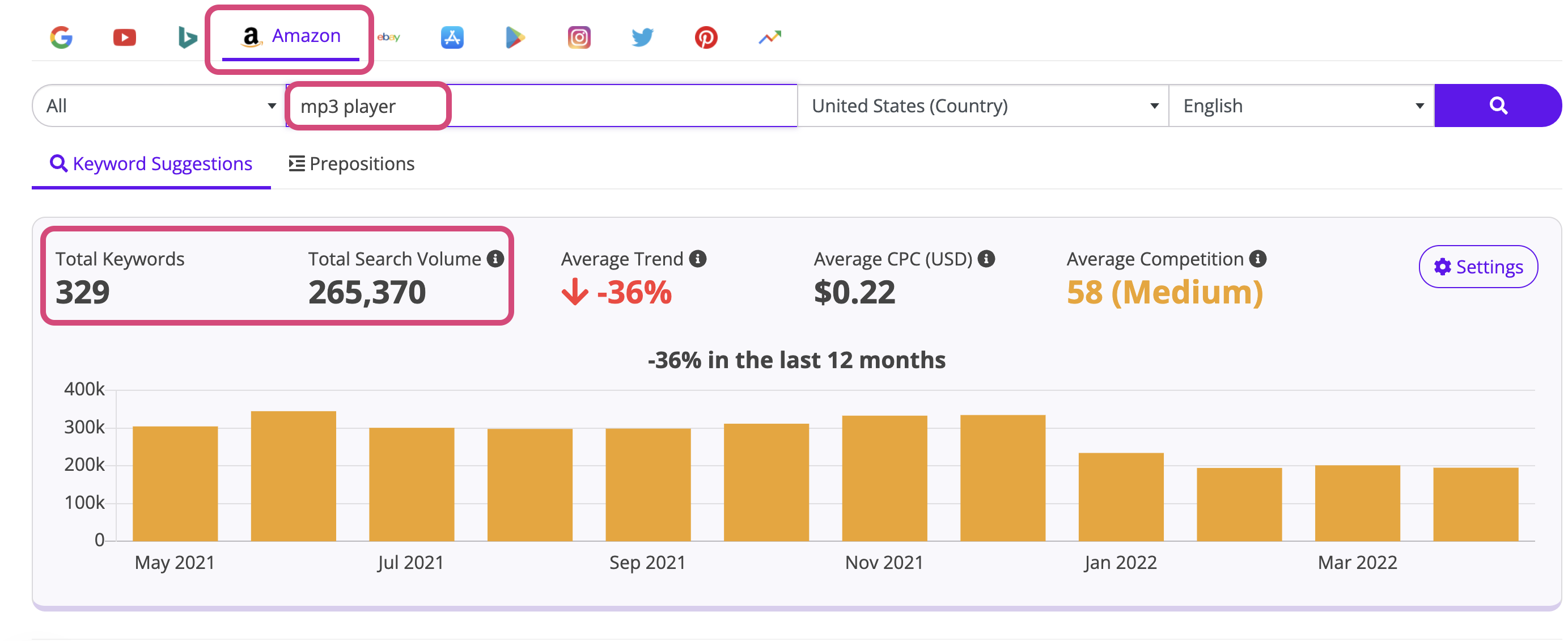
Then, scroll down to see the complete list of keywords related to “mp3 player” that you can use in your product’s title and description:
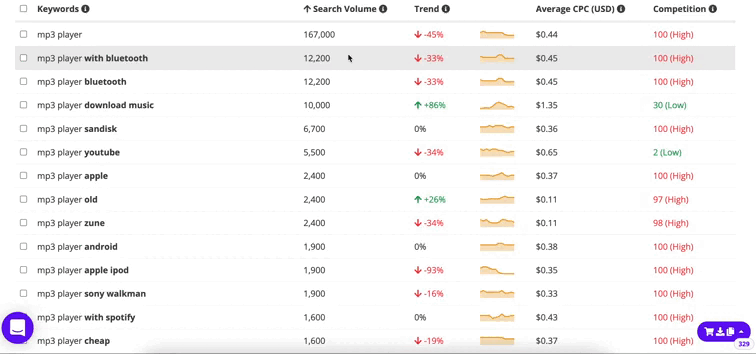
As you can see, there are a lot of keyword options that you can include in your “Hidden Keywords” section in your product listing, alongside the product’s titles and descriptions. Without using an Amazon keyword tool, you might not have known about these valuable keywords that can help to pull in extra organic traffic to your Amazon page.
You may expand your keyword list by not limiting yourself to just Amazon. You can also check other selling sites such as eBay and AliExpress. They may use same-selling techniques where you will be able to find effective keywords and other SEO tricks. Once you’ve found useful keywords, you can go ahead and create a newly expanded keyword list that will work best for your SEO strategy.
3. Spy on your competitors and learn from the best
One of the most efficient ways to search and collate keywords and search terms is with the help of suggestions. You can do this by inserting your product brand or type into Keyword Tool for Amazon. It will give you an idea as to what words, terms, and even phrases are effective in creating keywords that will sell your products. The results will give you hundreds of keyword suggestions that you can use alongside your primary focus keyword for the product you’re trying to rank.
One thing that you should remember is that it’s important to learn from the best. As you are well aware, Amazon does very well with useful keywords and SEO in general. It has its own tried-and-tested SEO formula, executed by SEO strategists and professionals, which you can employ to sell your products.
After all, selling is what Amazon primarily does, and it does this as effectively as possible. And what’s what makes Keyword Tool for Amazon so effective – it’s built specifically to extract and generate keywords from Amazon for FBA sellers to help rank their products higher.
4. Understand search behaviours and trends on Amazon
Another incredibly useful feature of Keyword Tool for Amazon is the trend data. When you type in a keyword into the input field, the results will show you the overall search trend for the generated keywords.
Let’s say you’re selling Bluetooth headphones in the United States market. Key in “bluetooth headphones” into the input field and press enter:
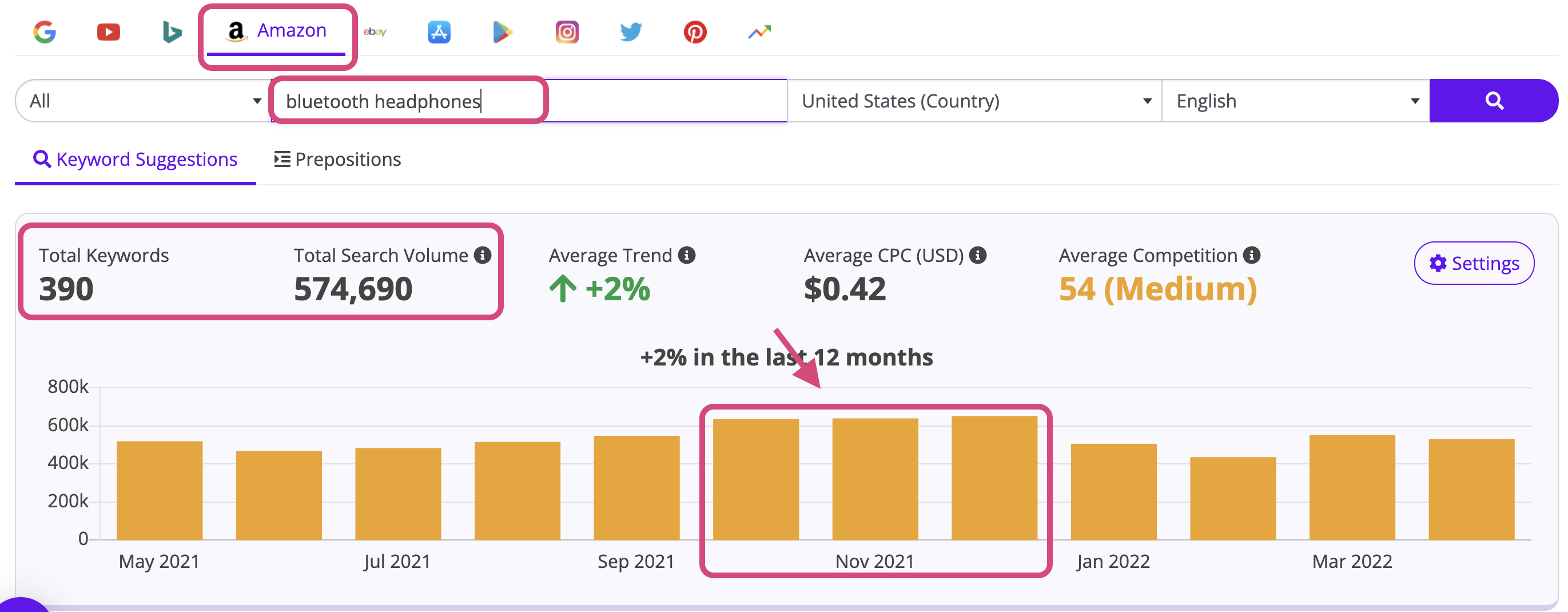
From the results, you can see that the highest searches in the US market happen from October to December. That directly coincides with Thanksgiving and Christmas, which means there’s a high likelihood that a lot of people are buying Bluetooth headphones as gifts (or for their own use during the year-end holidays – presumably after receiving their year-end bonuses).
Based on this trend that you’ve just picked up, you can now craft a targeted description that will increase the probability of attracting shoppers who are looking for Bluetooth headphones as presents. It’s not necessary to write your product descriptions to only focus on the product itself. It might be a smart idea to also write about how your customer can benefit from the product and what it can be used for. In this case, as a Christmas present.
5. Identify keywords for related products
Do you notice that when you search and browse through a product, Amazon will prompt you by showing other similar products that you might be interested in? It’s called the Amazon Recommendation system and that’s one of the ways that Amazon does great at converting casual browsers to customers or to keep the sale funnel open by enticing shoppers to purchase other items that might complement the one they’re purchasing.
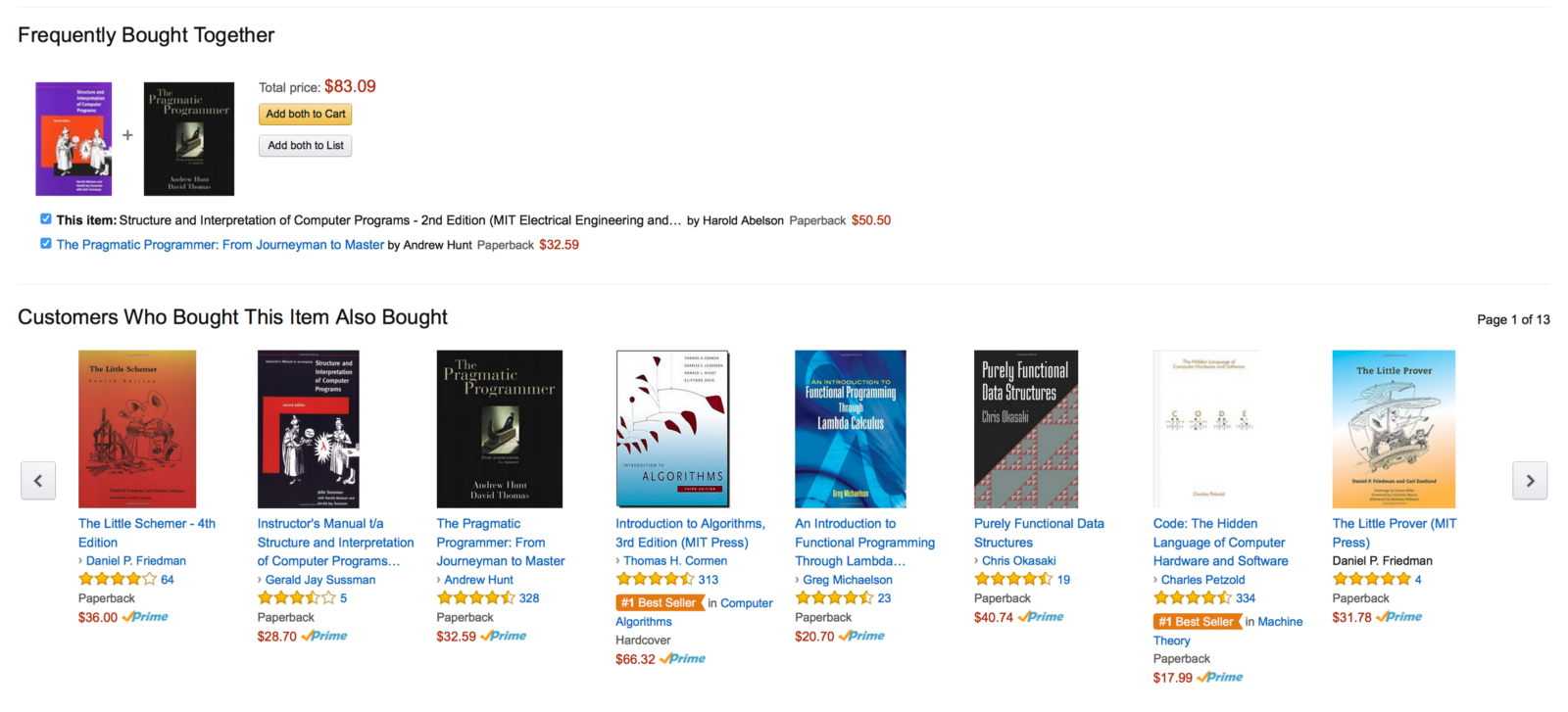
The ultimate goal of FBA sellers is to maximize sales. Which means you’d want your products to appear as high as possible on Amazon search while also appearing regularly as suggested items in other product pages.
To do this, you’ll need to do a little more analysis and think about what are the type of products that go well with what you’re selling. If you’re selling shoes, you can add related keywords like shoelaces, shoe rack, shoe polish, and others. If you’re selling a sous vide cooker, you can talk about recipe books, zip lock bags, or other cooking utensils that are related to sous vide. You get the drift.
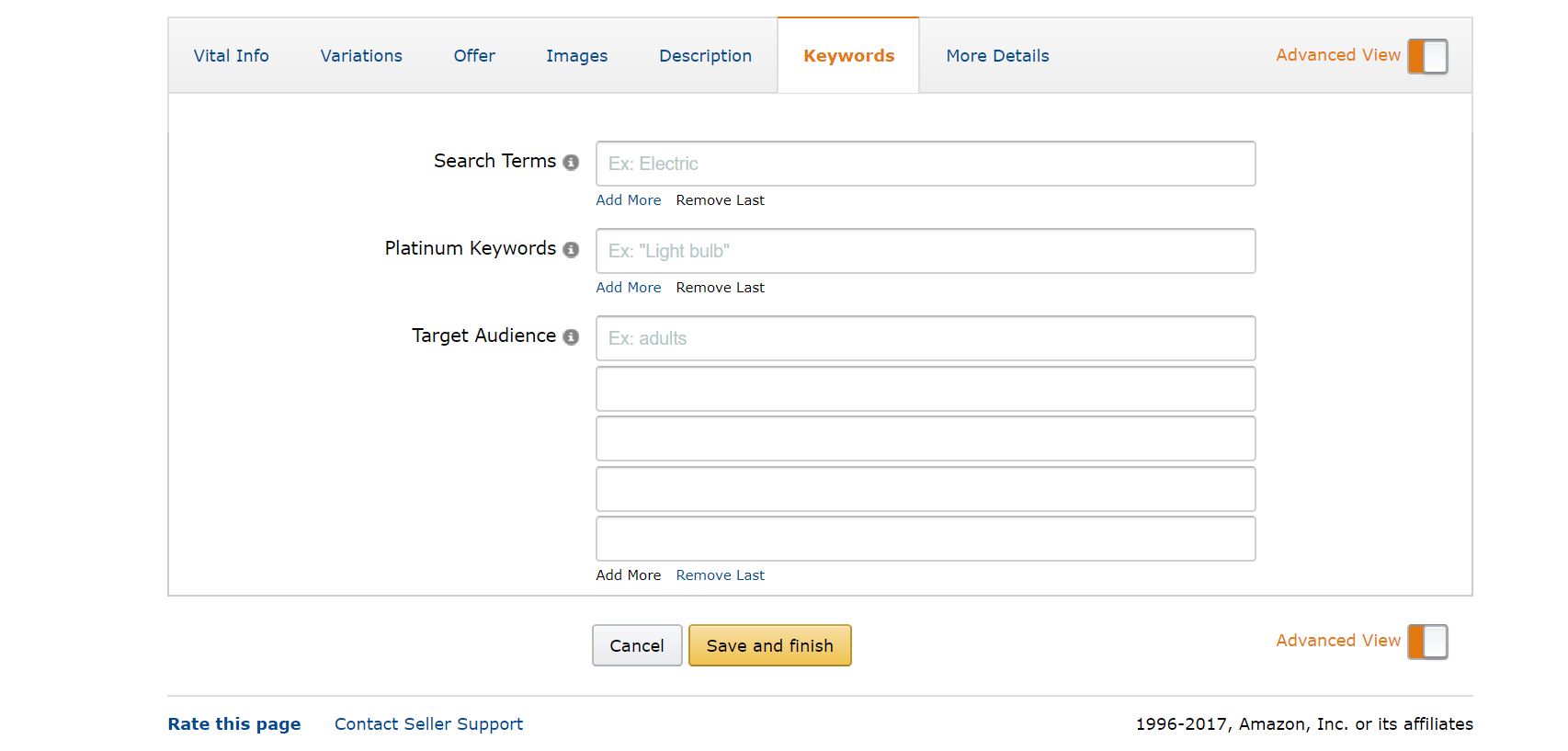
Once you’ve got a list of similar or complementary products to yours, type in the keywords into Keyword Tool for Amazon and select keywords with high search volumes. Then, include them in the “Hidden Keywords” section of your product listing and type them into your product’s description.
If you optimize this part well enough, Amazon’s algorithm should be able to pick them up and add them as suggested items in other Amazon product listings. And that will definitely add more potential revenue to your FBA business as it opens up a new sales channel for you.
You’d be surprised at how many FBA sellers don’t quite get their Amazon SEO right, or do their Amazon keyword research manually. By using these tips and leveraging off Keyword Tool for Amazon, you’ll have a huge leg up over your competitors. It’s the perfect way to scale up your FBA business and get more organic visits to your page for the long term.